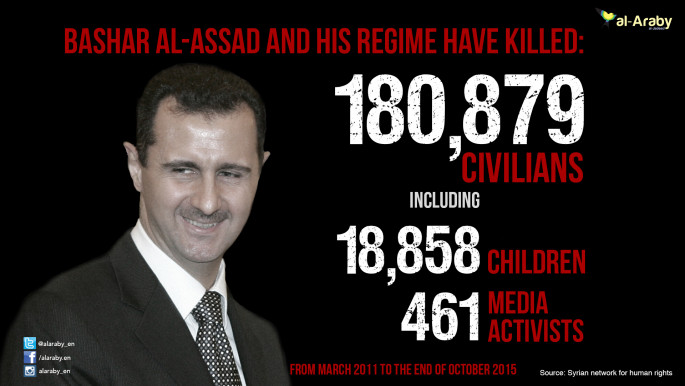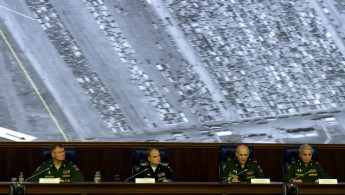Russian-Syrian joint military training to fight Syrian opposition groups
Russian and Syrian forces began joint training exercises in Syria's Latakia two weeks ago to prepare for fighting in Idlib, a Syrian opposition stronghold, according to a security force.
3 min read
Russia's top military officials hold a press conference on the fight in Syria [AFP]
Russian and Syrian forces began joint training exercises in Syria two weeks ago in the north of Syria's Latakia province to prepare for fighting in neighbouring rebel-held Idlib, according to a security source.
"The joint Russian-Syrian training began two weeks ago in the north of Latakia province," a regime stronghold on the country's coast, the source told AFP.
"In the next stage, Idlib will become the major destination and most important target of joint Russian-Syrian military operations," the source said.
The source said Idlib was now home to the largest number of rebel movements, excluding the Islamic State group, anywhere in the country.
Syrian opposition
Local sources told al-Araby al-Jadeed that the Armed Syrian opposition forces are suffering from unprecedented military pressure in the Aleppo countryside. He said that Russian war planes are providing air cover for regime forces and allied militias there.
Russia renewed air raids on Wednesday on the northern countryside of Latakia, northwest Syria, in conjunction with continuous clashes between opposition and Syrian regime forces there - on the peripheries of Jabal al-Akrad (Kurds' mountain) and Jabal al-Turkman (Turkmen mountain) areas.
Staunch Syrian government ally Russia began an aerial bombing campaign in support of regime forces on 30 September, saying it was targeting IS and other extremist groups.
But rebels from other groups accuse Russia of focusing its firepower more on moderate and Islamist opposition fighters than IS.
Family business
Russia has also focussed its attention on Turkey, with a number of Russian personalities and media outlets attacking Turkey's president and his family for alleged financial relationships with IS.
In response, President Recep Tayyip Erdogan on Wednesday said that Russia had no right to "slander" Turkey with allegations that it had bought oil from IS militants in Syria.
"No one has a right to engage in slander against Turkey by saying that Turkey is buying oil from [IS]," Erdogan said in comments broadcast by Turkish television on a visit to Qatar, after the Russian defence ministry claimed he and his family were involved in the illegal oil trade.
Russian Defence Minister Anatoly Antonov had pointed the finger at the recent appointment of Erdogan's son-in-law Berat Albayrak as energy minister and alleged that the president's son runs one of the country's main energy companies.
"What a fantastic family business," he said, claiming that "terrorists" in Syria made some $2 billion each year out of the illegal oil trade.
The inflammatory allegations - the latest in a ferocious war of words - came as Russian Foreign Minister Sergei Lavrov said he had agreed to meet his Turkish counterpart for the first high-level face-to-face talks since Turkey downed a Russian plane last week.
"The joint Russian-Syrian training began two weeks ago in the north of Latakia province," a regime stronghold on the country's coast, the source told AFP.
"In the next stage, Idlib will become the major destination and most important target of joint Russian-Syrian military operations," the source said.
The source said Idlib was now home to the largest number of rebel movements, excluding the Islamic State group, anywhere in the country.
Syrian opposition
Local sources told al-Araby al-Jadeed that the Armed Syrian opposition forces are suffering from unprecedented military pressure in the Aleppo countryside. He said that Russian war planes are providing air cover for regime forces and allied militias there.
Russia renewed air raids on Wednesday on the northern countryside of Latakia, northwest Syria, in conjunction with continuous clashes between opposition and Syrian regime forces there - on the peripheries of Jabal al-Akrad (Kurds' mountain) and Jabal al-Turkman (Turkmen mountain) areas.
Staunch Syrian government ally Russia began an aerial bombing campaign in support of regime forces on 30 September, saying it was targeting IS and other extremist groups.
But rebels from other groups accuse Russia of focusing its firepower more on moderate and Islamist opposition fighters than IS.
 |
Family business
Russia has also focussed its attention on Turkey, with a number of Russian personalities and media outlets attacking Turkey's president and his family for alleged financial relationships with IS.
In response, President Recep Tayyip Erdogan on Wednesday said that Russia had no right to "slander" Turkey with allegations that it had bought oil from IS militants in Syria.
"No one has a right to engage in slander against Turkey by saying that Turkey is buying oil from [IS]," Erdogan said in comments broadcast by Turkish television on a visit to Qatar, after the Russian defence ministry claimed he and his family were involved in the illegal oil trade.
Russian Defence Minister Anatoly Antonov had pointed the finger at the recent appointment of Erdogan's son-in-law Berat Albayrak as energy minister and alleged that the president's son runs one of the country's main energy companies.
"What a fantastic family business," he said, claiming that "terrorists" in Syria made some $2 billion each year out of the illegal oil trade.
The inflammatory allegations - the latest in a ferocious war of words - came as Russian Foreign Minister Sergei Lavrov said he had agreed to meet his Turkish counterpart for the first high-level face-to-face talks since Turkey downed a Russian plane last week.





 Follow the Middle East's top stories in English at The New Arab on Google News
Follow the Middle East's top stories in English at The New Arab on Google News
![The UAE is widely suspected of arming the RSF militia [Getty]](/sites/default/files/styles/image_330x185/public/2024-11/GettyImages-472529908.jpg?h=69f2b9d0&itok=Yauw3YTG)
![Netanyahu furiously denounced the ICC [Getty]](/sites/default/files/styles/image_330x185/public/2024-11/GettyImages-2169352575.jpg?h=199d8c1f&itok=-vRiruf5)
![Both Hamas and the Palestinian Authority welcomed the ICC arrest warrants [Getty]](/sites/default/files/styles/image_330x185/public/2024-11/GettyImages-2178351173.jpg?h=199d8c1f&itok=TV858iVg)